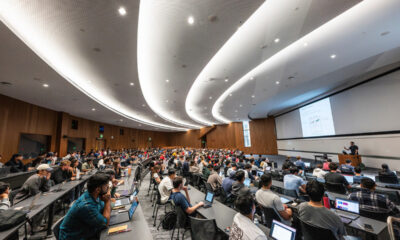Education
Rethinking Higher Education: The Shift from Degrees to Skills

The conversation surrounding higher education is changing dramatically, particularly in light of the competitive job market. The quest for degrees, diplomas, and certifications is now accompanied by a growing debate regarding their actual value. As student debt skyrockets and the labor market evolves, individuals are reevaluating whether traditional educational paths are the best route to career success.
The Allure of Traditional Degrees
Traditionally, obtaining higher education has been associated with numerous advantages. Statistics consistently show that graduates tend to earn significantly more over their lifetimes compared to individuals without degrees. For fields like medicine, engineering, and academia, advanced degrees are often prerequisites.
Many view the journey toward a degree as a milestone, symbolizing hard work and intellectual achievement. The college experience is frequently described as transformative, fostering critical thinking and social connections that last well beyond graduation. Employers often highlight soft skills, such as communication and teamwork, developed during these formative years, as highly desirable traits in job candidates.
While these benefits are well-documented, they come with a hefty price tag. In 2023, the escalating cost of higher education has resulted in student loan debt in the United States exceeding **$1.7 trillion**. This financial burden can overshadow the perceived benefits of earning a degree, leading many graduates to find themselves in jobs that do not require their qualifications.
The increasing number of degree holders in the job market raises questions about whether a degree is still a reliable pathway to opportunity. As the supply of graduates grows, the perceived value of these credentials may be diminishing, prompting a reassessment of what constitutes adequate education for today’s workforce.
Shifting Focus: Skills Over Credentials
In response to these challenges, the labor market is gradually gravitating towards a skill-based hiring approach. Prominent companies, including **Google**, **Apple**, and **IBM**, are leading this shift by prioritizing skills and competencies over traditional educational qualifications. This trend reflects a broader recognition that practical experience and on-the-job training can be just as valuable, if not more so, than a formal degree.
Educators and policymakers are advocating for alternatives to the conventional degree system. Options such as vocational training, apprenticeships, and micro-credentialing programs are gaining traction. These routes provide practical experience while minimizing or eliminating the financial burden often associated with a four-year degree.
The evolving landscape of employment and education indicates that the credential conundrum is unlikely to resolve itself simply. Individual circumstances, career aspirations, and family backgrounds all play significant roles in the decision to pursue higher education.
Balancing the merits of a degree with the practical skillsets employers seek will require a cultural shift in how society views education and success. Educational institutions must adapt by integrating technology, promoting lifelong learning, and collaborating with industry partners to ensure that their curricula align with market needs.
Students, for their part, should explore diverse pathways, seeking knowledge and skills that align with a rapidly changing job environment.
In summary, the pursuit of degrees remains a central narrative in society, but it must evolve. By emphasizing skills, fostering innovation in education, and promoting flexible pathways, society can transform the credential conundrum into opportunities for a more inclusive and effective approach to learning and career development. As we navigate this changing terrain, it is crucial to challenge the notion that a degree is the only path to success, recognizing that numerous routes exist for achieving professional and personal fulfillment in today’s world.
-

 Technology4 months ago
Technology4 months agoDiscover the Top 10 Calorie Counting Apps of 2025
-

 Health2 months ago
Health2 months agoBella Hadid Shares Health Update After Treatment for Lyme Disease
-

 Health3 months ago
Health3 months agoErin Bates Shares Recovery Update Following Sepsis Complications
-

 Technology3 weeks ago
Technology3 weeks agoDiscover 2025’s Top GPUs for Exceptional 4K Gaming Performance
-

 Technology2 months ago
Technology2 months agoElectric Moto Influencer Surronster Arrested in Tijuana
-

 Technology4 months ago
Technology4 months agoDiscover How to Reverse Image Search Using ChatGPT Effortlessly
-

 Technology4 months ago
Technology4 months agoMeta Initiates $60B AI Data Center Expansion, Starting in Ohio
-

 Technology4 months ago
Technology4 months agoRecovering a Suspended TikTok Account: A Step-by-Step Guide
-

 Health4 months ago
Health4 months agoTested: Rab Firewall Mountain Jacket Survives Harsh Conditions
-

 Lifestyle4 months ago
Lifestyle4 months agoBelton Family Reunites After Daughter Survives Hill Country Floods
-

 Technology3 months ago
Technology3 months agoUncovering the Top Five Most Challenging Motorcycles to Ride
-

 Technology4 weeks ago
Technology4 weeks agoDiscover the Best Wireless Earbuds for Every Lifestyle





















